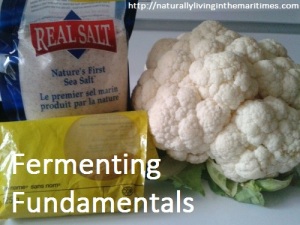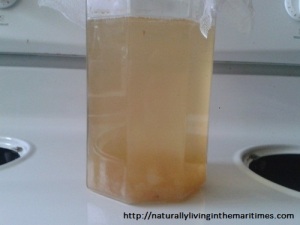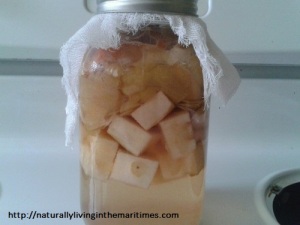Hooray! It’s the first Fermenting Friday EVER! I hope you’re as absolutely excited as I am. As I’m new to fermenting, I’m going to share with you what I’ve learned, and I can’t wait to give you my rehashed quick-and-easy version of how to ferment!
First and foremost:
WHY would you ever want to ferment?
I told a girlfriend of mine I was fermenting and she visibly shuddered. The word “ferment” is to some the way “moist” is to others. To me, when I hear FERMENT, I hear centuries of civilizations who’ve tried and tested amazing methods of pickling, sourdough baking, soaking grains, and brewing delicious things like kefir and kombucha. I also hear wine & beer, and really, whats a good kitchen party without wine or beer.
Fermentation has been found in civilizations as far back as ancient Turkey (thank YOU Michael Pollen for that awesome tidbit – buy Cooked here) and has been a part of Chinese, Russian, German, and many other cultures since, including here in North America. People still do ferment. Do you have Sauerkraut on your sausages? If it was traditionally made, the process to get that distinct ‘krauty taste is from fermentation.
Fermentation provides the great little bacteria that keep your gut nice and healthy. It’s why I drink kefir (& soon, kombucha once I get my SCOBY!). The GAPS diet specifically encourages the use of fermented foods (even just beginning with the liquids from them early in the introductory period) for those who are dedicated GAP(S)-ers. Any diet is benefited by the introduction of fermented foods. It’s also very helpful for Vegans & Vegetarians (B12 absorption) and just anyone else with a known leaky gut or bacteria imbalance. Or just anyone.
According to Mother Earth News, fermenting foods:
- makes nutrients more bioavailable (easier for your body to absorb).
- predigests the foods (soaking grains, if you’ve ever done this, is a key example!).
- adds additional nutrients and can nullify or remove the anti-nutrients and bad bacteria.
- maintaining a good intestinal balance of good, and healthy bacteria (achieved by eating foods loaded in probiotics… ahem… fermented foods) can greatly strengthen your immune system.
Fermentation is also known to increase the B vitamins (including B12 which, for me, is a huge help) and Omega 3’s (The Healthy Ones) present in your foods!
Why wouldn’t you want to ferment?
What Do You Need To Ferment?
Fermenting is a very easy process. All you need is a good jar, with a lid or a weight that encourages the food to stay under the brine so it doesn’t mold. You’ll also need your item to ferment, your salt or whey (depending on recipe or choice) and time.
You can get big fancy fermenting crocks that can be very expensive, or you can use a crock pot. You can use a mason jar with a little app. plate in it. You can also get air locks with bubblers that are fancy little contraptions that allow for air to escape during the process but not explode your jar.
They look a lot like this. I can’t vouch for this product specifically because I haven’t tried it, but that is what the airlocks look like.
If you aren’t using an airlock (like me), you can simply be sure to burp the jar (if you read the post on kefir, you’ll know that burping means that you open your jar to allow gas to escape instead of building up too much) daily.
I will be using mason jars and this is my first vegetable ferment done with lacto fermentation.
You do need to use salt (and good quality – I use Redmond’s Real Salt) for your brine. It’s what keeps down the bad bacteria and encourages the ferment. I’m all for fiddling with recipes, so let me know if you’ve experimented with more or less salt/whey and had good experiences (or not so good).
How Do I Ferment (Recipe Time)?
Check out the recipe for Curried Lacto-Fermented Cauliflower from Cultures For Health.
Next week, I’ll fill you in on how it went!




I just started following you a couple weeks ago yet I have to say this is one of my favorite blogs so far! Maybe I’m biased cause I’m also from the maritimes lol. Can’t wait to see what other interesting stuff you write about and to try out some of your DIY projects. Fermenting does sound scary but with all those benefits you listed I think I’m going to give it a try as well!
I am so excited to hear it! I’m glad to find another fellow maritimer. Good luck on your fermenting! I can’t wait to hear how it goes! I love your blog too, and can’t wait to see more.